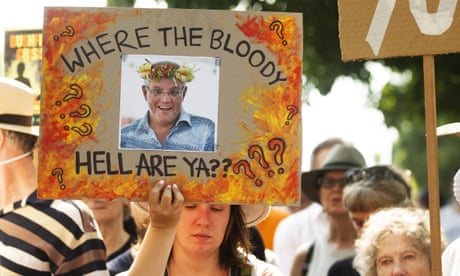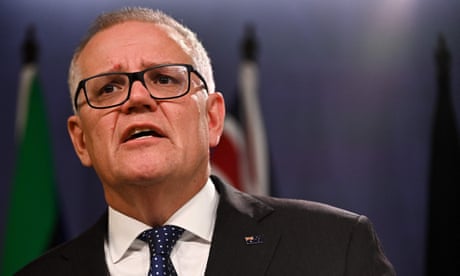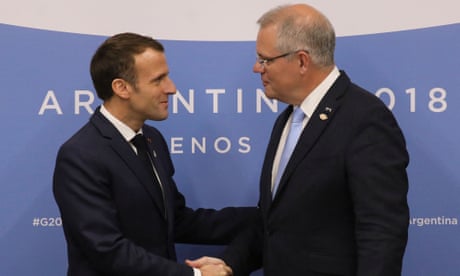Extract from The Guardian
Former PM tells ABC how ministries plan ‘drifted from his memory’, while Coalition figures recall of government’s lack of humility and soured relations.
Mon 12 Feb 2024 23.49 AEDT
Last modified on Tue 13 Feb 2024 00.19 AEDTTracing from his “miracle” election campaign in 2019 against the odds, through the Black Summer bushfires and Morrison’s infamous Hawaiian holiday, to the French submarine fracas and the Aukus agreement, and of course the Covid pandemic – this is what we learned in Nemesis episode three.
Government ‘lack of humility’: Pyne
Following Morrison’s election win after the ousting of Malcolm Turnbull, the new prime minister’s authority was at a high. Former cabinet minister Christopher Pyne claimed Morrison’s team “decided they’d won the election because they were geniuses”.
“That lack of humility, I think, infected too many people in the Morrison government, who believed that they could do no wrong,” he said.
Dave Sharma, now a senator but then a Liberal MP, said Morrison “had a very high level of authority as the prime minister.”
“Of course, that can be a very good thing, but it can also be a dangerous thing.”
Colleagues ‘gobsmacked’ by Hawaii trip
Morrison’s first major scandal was his decision to quietly fly out for a family holiday to Hawaii. His office initially denied to journalists that he’d done so.
Michael McCormack, then-Nationals leader, became acting PM on Morrison’s departure – but this wasn’t publicly announced. McCormack recounted that he asked the prime minister’s office what he should say when asked if he was acting prime minister.“The answer came back, ‘well, do you have to do that?’” McCormack said.
“I said, ‘yes, I do.’ I think the thought was, ‘well, maybe can you just faff around that?’ But no, I’m not that sort of person.”
Liberal senator Andrew Bragg called the situation “strange”.
“It looked as if there had been lies told to the [press] gallery,” he said.
Russell Broadbent, a former Liberal MP now on the crossbench, said he was “gobsmacked”.
Morrison repeated earlier explanations, pointing to errors from his staff in how the trip was communicated, and admitting: “some of those issues were clunky in their handling.”
National cabinet made premiers too important: Joyce
The Covid pandemic was characterised by a lack of “urgency” from the federal government, claimed Victorian premier Daniel Andrews.
Western Australia’s leader Mark McGowan claimed Morrison’s plans through Covid were “too centralist”.
“He always just had the view that it had to be a one-size-fits-all,” McGowan claimed.
Barnaby Joyce, deputy prime minister through part of Morrison’s leadership, claimed the invention of national cabinet allowed Morrison to be “usurped”.
“The premiers became more important than the prime minister,” Joyce claimed.
Andrews said the national cabinet “brought out the best and worst in all of us”. He later referred to Josh Frydenberg, then the treasurer, as “the worst one”.
Multiple ministries decision ‘took on the run’
Morrison gave a greater explanation of his decision to appoint himself to the departments of health, finance, treasury, home affairs and resources.
Greg Hunt, then health minister, said Morrison had informed him of the health ministry decision in 2020; Morrison said it was discussed at the national security commitee of cabinet, with concerns over the wide-ranging biosecurity powers for that minister.
“These were frightening powers, and I wanted safeguards around me,” Hunt said.
Morrison claimed the fact finance minister Mathias Cormann was not informed of the decision was “a genuine omission and one I was unaware of”.
In 2021, Morrison then put himself into treasury and home affairs. No reason was given, Morrison only saying: “it was a decision we took on the run one day… it drifted from my memory later on because [the powers] were never used. So yeah, regrets over that.”
Liberal colleagues including James Paterson (“deeply shocked”), Katie Allen (“livid”) and Warren Entsch (“stupid”) were among those to criticise the decision.
Frydenberg ‘extremely disappointed’
The treasurer, Morrison’s close ally, said he was “extremely disappointed” at the PM’s decision to appoint himself to treasury: “particularly that it wasn’t made transparent to me and to others. I thought it was unnecessary. I thought it was an example of extreme overreach”.
Morrison said he apologised to Frydenberg, that they’d “reconnected” and were now “as good of friends as you could hope for”.
Frydenberg’s take on the issue: “It impacted that relationship and still does to this day.”
Keith Pitt, then resources minister, claimed Morrison’s appointment to the resources portfolio – so Morrison could block the PEP-11 gas development – was a “breach of the Coalition agreement”.
Morrison said he didn’t regret the PEP-11, maintaining it was the right decision, and that he had the authority to make the decision.
“Problems” with Holgate Australia Post affair: McKenzie
On the Christine Holgate incident, where the then Australia Post chief approved Cartier watches for some staff, Morrison said he believed his request for her to stand aside was “quite reasonable” – but admitted he had been “forceful” and “could have had a glass of water beforehand”, regarding criticism of his call that “she can go” if she didn’t stand aside.
Joyce called Morrison’s response “ridiculous”.
Martin Parkinson, former secretary of the prime minister and cabinet, described Morrison as “domineering, whose relationship with the female members of his cabinet left a lot to be desired. I just don’t think he ever really valued women’s perspectives”.
Morrison rejected a question about whether he had a “problem with women”.
Reynolds: ‘my head exploded’
The program went on to the allegations made by Brittany Higgins, a former staffer for senator Linda Reynolds – who on Monday announced her impending retirement from politics.
Reynolds said, upon hearing Higgins’ allegations of being raped by fellow staffer Bruce Lehrmann inside Reynolds’ ministerial suite in 2019, “it was sort of like my head had exploded”. Lehrmann has always maintained his innocence and strongly denied the allegations. A 2022 criminal trial was aborted due to juror misconduct and a second was abandoned because of prosecutors’ fears for Higgins’ mental health.”
Asked about her description of Higgins as a “lying cow” – remarks for which she apologised to Higgins, plus paying legal costs and a donation to a sexual assault charity – Reynolds responded: “I did utter those words, but it was about what was being said about Fiona [Brown, chief of staff] and myself and what happened subsequently. It was never, ever about whether I believed or disbelieved her [Higgins].”
‘Women lost faith in us’: Littleproud
Morrison’s response to Higgins’ allegations, and a growing focus on culture and behaviour in parliament, became a political problem for the Coaltiion.
“I think women had lost faith in us because we didn’t handle those situations well. That was the real beginning, where Australians stopped listening, but particularly women stopped listening,” said Nationals leader David Littleproud.
Nationals MP Darren Chester said the issue “became something very difficult for Morrison to manage… And then the National party made it worse by electing a deputy prime minister who was also seen to have a problem with women”.
“So we guaranteed, by returning Barnaby Joyce to leadership as a National party, that women would be a big issue at the election campaign,” he said, commenting on Joyce’s return to the Nationals leadership in 2021.
Joyce called that claim “rubbish”.
Vaccine delay ‘worrying’
Jane Halton, the former senior health bureaucrat involved in vaccine logistics for the Covid rollout, said she “shouted at the television” when Morrison began saying the vaccination program was “not a race”.
“I never do that. I was so angry I can’t describe it to you. It was just so wrong,” Halton said. “It was the F word and it was rather loud…it was always a race.”
‘No-one worked harder’
While many colleagues were critical of Morrison’s leadership, others were very complimentary. Sussan Ley, now deputy Liberal leader, said she hadn’t seen anyone work harder than Morrison did during the pandemic.
“He didn’t sleep. And that went on week after week, month after month,” she said.
Reynolds said: “I don’t know how this man is still standing.”
Andrews said he regretted that Morrison’s multiple ministry scandal may overshadow his achievements during Covid.
“On many things, he did a good job. Some people will be shocked to hear me say that, but they forget that JobKeeper was incredibly important,” he said.
“They forget that even though the vaccines took too long, we did get to one of the highest double-dose rates anywhere in the world. There’s a risk that I think that all just gets washed away, and that’s a bit sad.”
Aukus ‘the best’ decision of his government: Morrison
Morrison again defended his decision to scrap the French submarine deal and launch the Aukus pact. He said he’d told French president Emmanuel Macron that Australia wanted nuclear submarines, not the diesel electric models under construction by a French company
Shrugging off the fury of Macron, who claimed Morrison had lied to him, the former PM said: “You don’t cancel a $90bn contract and the other party is happy”.
Regarding the secrecy over the Aukus pact, Morrison claimed Macron would have “deployed the entire French diplomatic corps and killed the deal” if France had been informed earlier.
Turnbull said it was a “humiliation” for Macron, and that it was “the worst decision of [Morrison’s] government”.
Morrison shrugged that off.
“That’s not what history will record it as. It will record it as the best, and one that others had never sought to successfully undertake,” he said.
Frydenberg urged to challenge
As the 2022 election loomed, some Liberals discussed the leadership. Ken Wyatt and Entsch said they thought Frydenberg could be a “stabilising” force. But the treasurer said he believed loyalty to Morrison was more important.
Morrison said he “never doubted [Frydenberg] for a moment”. Angus Taylor said he didn’t believe Frydenberg had the numbers to challenge.



No comments:
Post a Comment